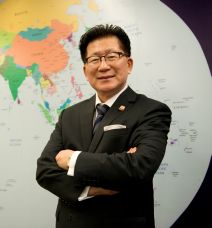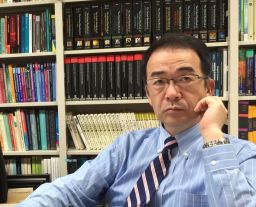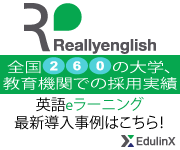September 4th, 2016
Dear participants and supporters of the JACET 55th International Convention (2016, Sapporo),
We are deeply grateful for your attending the JACET 55th International Convention (2016, Sapporo) at Hokusei Gakuen University, Sapporo, and would like to take this opportunity to thank you for your contribution to JACET.
We hope you enjoyed and benefited from this convention in many ways. In particular, we hope you were able to take away many new ideas and consider how you might apply the latest linguistic theories and teaching practices to the improvement of English language learning in your various contexts.
We aim to work toward this goal through English language education, which is becoming increasingly important as the world becomes more globally interconnected.
We hope that JACET, with the cooperation of other academic organizations, can contribute to English language education in order to promote peace and understanding among peoples around the world.
We look forward to seeing you in Tokyo at the JACET 56th International Convention (2017, Tokyo). Best wishes for the continuing advance of your research and educational efforts through the JACET network.
Yours sincerely,
Hajime Terauchi PhD, President
The Japan Association of College English Teachers
(JACET)
大学英語教育学会第55回(2016年度)国際大会 ご参加の皆様 賛助会員の皆様
平素は本学会の活動にご協力いただき,ありがとうございます。
2016年9月1日より9月3日まで,札幌市の北星学園大学にて開催いたしました大学英語教育学会第55回(2016年度)国際大会にご参加いただきありがとうございました。
皆様のご協力のおかげで,成功裏に終了することができました。改めまして御礼申し上げます。
グローバル化がより進んだこの時代に対応するべく,今後も皆様にご満足いただける大会を開催するよう企画運営をいたしますので,本学会の活動にご協力いただきますようお願い申し上げます。
2016年9月4日
一般社団法人大学英語教育学会
会長 寺内 一
| JACET 55th International Convention (2016, Sapporo) | |
|---|---|
| 大学英語教育学会 第55回(2016年度)国際大会 | |
| Theme: | Designing English Education in a Borderless Era 「ボーダレス時代における英語教育をデザインする」 |
| Dates: | September 1 (Thu.) to September 3 (Sat.), 2016 2016年9月1日(木)~9月3日(土) |
| Venue: | Hokusei Gakuen University 2-3-1, Oyachi-Nishi, Atsubetsu-Ku, Sapporo, 004-0042, JAPAN 北星学園大学 〒004-8631 北海道札幌市厚別区大谷地西2-3-1 |
| Abstract: | Many pedagogical approaches have been developed and implemented to cope with the teaching challenges we face. Much research has been conducted to investigate what approaches or techniques are effective, how students are evaluated, and/or what resources are to be directed towards the growing needs for English competency in a borderless era. From the practitioner’s viewpoint, we are faced with the issues of how to work with an ever increasing number of diverse needs and with students who often approach second language learning with vastly different expectations. The JACET 55th (2016) International Convention will comprehensively discuss new perspectives and initiatives for English education from the primary to college levels centering on the three themes of pedagogy, materials development, and evaluation. We will examine these innovative approaches from the viewpoint of second language acquisition theory. While progressing with interdisciplinary research in the context of globalization and plurilingual environments, we will also explore how to design and implement new pedagogical methods adapted to the globalized era and the integrated teaching of language and contents. The JACET 55th (2016) International Convention will offer opportunities for discussion on all levels of English education for the classroom and beyond in this borderless era and investigate how insights gained from such research and discussion can be applied to tertiary education. これまで私達が直面する課題を解決するために,多くの指導法が開発され,実践されてきた。また,ボーダレス時代における英語運用能力の必要性の高まりを背景にして,多くの研究がなされてきており,指導法や指導技術がどれほど効果的であるか,学生をどのように評価するのか,どのような教材が用いられるべきかが調べられてきた。実際の授業の場面においても,私達はこの必要性に応じて対処しなければいけないし,第二言語学習に対する多様な期待を裏切らないために処置を講じていかなければいけない。 大学英語教育学会第55回(2016年度)国際大会では,小学校から大学までの英語教育の新たな展望や取り組みに関して,教育法,教材開発,そして,評価という三つのテーマを中心に俯瞰的に議論し,それら革新的なアプローチについて第二言語習得理論から考察を加える。また,グローバリゼーションと多言語社会を背景にした学際的な研究が進む中,時代に対応した新たな指導法,言語と教科内容(コンテンツ)の統合をどのようにデザインし実施していくかを考察する。本大会では、このボーダレス時代におけるクラスルーム内外の英語教育全般を視野に入れた議論の場とし,いかに大学教育に応用できるのかを探求したい。 |
|
|
|
| Plenary Speakers: (基調講演者) | ||
| 1. | Nina Spada (Prof. of University of Toronto) | |
 |
||
| Title: Focusing on language in meaning/content-based instruction: A delicate balance | ||
| Abstract: In this presentation I will explore the benefits and challenges for second/foreign language (L2) learning within the context of meaning/content-based approaches to L2 instruction. This includes communicative language teaching (CLT) and content and language integrated learning (CLIL). CLT was introduced to the field of L2 instruction in the late 1970s and while it has become a familiar approach over the decades, there are different interpretations of it and ways in which it has been implemented (e.g. strong versus weak versions of CLT). CLIL entered the field later in the 1990s and for a long time was implemented primarily in Europe. In recent years CLIL has become popular in many other countries in the world including Japan. CLT is based on the assumption that language learning is most effective when it takes place within the context of genuine meaningful communication. CLIL is motivated by the belief that when learners are engaged in motivating, academic subject-matter content (i.e. CLIL) successful language learning will take place at the same time. I will begin my talk by describing some of the history and theory relevant to CLT and CLIL. This will be followed by a review of classroom research showing positive effects on L2 learning in CLT and CLIL (as well as in other content-based language teaching) programs. Next I will discuss research pointing to some of the difficulties in L2 learning (and L2 teaching) when the primary or exclusive instructional focus is on meaning/content. Finally, I will discuss different ways in which attention to language can be provided in content/meaning-based programs. This will include a discussion of the use of isolated and integrated form-focused instruction in CLT programs and the application of functional grammar in CLIL programs. |
||
| Bio-data: Dr. Nina Spada is Professor in the Language and Literacies Education program at the University of Toronto where she teaches courses in second language acquisition (SLA), research methods and classroom research in L2 learning and teaching. Her classroom research investigates the effects of instruction on L2 learning and how different combinations of language and meaning-focused instruction contribute to the development of different types of L2 knowledge. Her large-scale research and numerous publications in instructed SLA have had a significant impact on the conceptualization and design of research investigating the teaching and learning of second/foreign languages nationally and internationally. Dr. Spada is co-author of How Languages are Learned published by Oxford University Press and co-editor of the Oxford Key Concepts for the Language Classroom series linking research with classroom practice. She is also co-editor of the Language Learning and Teaching series with John Bejamins Publishing and Past President of the American Association for Applied Linguistics. |
||
|
|
||
| 2. | Kaye Chon (Prof. of Hong Kong Polytechnic University) | |
 |
||
| Title: Tourism and Hospitality Industry in Asia Pacific: Current Issues and Trends | ||
| Abstract: Tourism and hospitality industry globally represents more than eight percent of all employment. The industry continues to grow as a result of increasing disposable income due to industrialization and economic mobility of the world population. The Asia Pacific region currently accounts for approximately 23% of global arrivals of tourists and is the fastest growing region of the world. Many of the most populous nations in the world, for example China and India, are increasingly becoming industrialized and as a result people from these countries now have the economic means to travel internationally. Many destinations, especially those in the Asia Pacific region, have benefited from this trend and it is evidenced by the fact that more than 80% of tourist arrivals to Asia Pacific countries are realized from other Asia Pacific countries and regions. In recent years, the Japanese government has implemented a highly successful tourism promotion campaign and the visitor numbers to Japan will continue to grow in the years to come, especially with the organization of mega events like the Summer Olympics to be held in Tokyo in 2020. This presentation aims to highlight the major trends, issues, and challenges associated with tourism and hospitality industry in Asia Pacific and provide some suggestions with practical implications for Japan’s tourism and hospitality industry as well for language educators in Japan. |
||
| Bio-data: Professor Kaye Chon is Dean, Chair Professor, and Walter Kwok Foundation Professor in International Hospitality Management at The Hong Kong Polytechnic University School of Hotel & Tourism Management. In 2011, Prof. Chon received the Ulysses Prize from the United Nations World Tourism Organization (UNWTO.) Commonly known as “Nobel Prize in Tourism,” the Ulysses Prize is annually given to one scholar for distinguished contribution to knowledge creation in tourism. A frequent speaker in international conventions and industry seminars, Professor Chon published more than 200 academic papers and 9 books throughout his academic career which spans three decades. He is currently serving as the Chief Editor of Asia Pacific Journal of Tourism Research and Journal of Travel & Tourism Marketing. Under Prof. Chon’s leadership, the Hong Kong Polytechnic University’s School of Hotel & Tourism Management has arisen as a leading school of hospitality and tourism management in the world. The School is housed in a US$170 million complex which consists of the School facilities and a unique deluxe hotel, Hotel ICON, which has been consistently ranked among top five hotels in Hong Kong by TripAdvisor among more than 700 hotels in Hong Kong. Professor Chon is a graduate of the University of Maryland, Georgia State University, University of Nevada – Las Vegas, and Virginia Tech and he was previously a professor at University of Houston. Professor Chon is listed in Who’s Who In the World. |
||
|
|
||
| 3. | Yukio Tono (Prof. of Tokyo University of Foreign Studies) | |
 |
||
| Title: The CEFR-J and its Impact on English Language Teaching in Japan | ||
| Abstract: The Common European Framework of Reference for Languages (CEFR) has been extensively used not only in Europe but in other parts of the world as a reference framework for teaching, learning and assessment. All the language syllabuses in Europe are now based on the CEFR and major language tests around the world are now aligned to the CEFR levels. There is a growing interest in the use of the CEFR for English language teaching (ELT) in Japan as well. The MEXT, for example, encourages secondary schools or local boards of education to create can-do descriptors to set the learning objectives at each school or district. They also introduce the concept of the CEFR levels as an international benchmark for language proficiency and aim to revise the Course of Study to make it comparable to the CEFR scales. In this talk, I will report on a series of research in the CEFR-J project and its impact on ELT in Japan. First, the development of original can-do descriptors and their validation studies will be described. Then I will report on reference level descriptions (RLDs) for the CEFR-J, which include the compilation of wordlists (CEFR-J Wordlist), descriptor database (ELP Descriptor Database), inventories of grammar (CEFR-J Grammar Profile), profile of text characteristics (CEFR-J Text Profile), and profile of learner errors (CEFR-J Error Profile). Together with the CEFR-J descriptors, it will provide a detailed framework of how vocabulary and grammar should be graded or sequenced according to the CEFR(-J) levels. Finally, I will discuss the implications of the CEFR-J project in relation to the MEXT’s reform on ELT in Japan. |
||
| Bio-data: Yukio Tono is Professor of corpus linguistics at Tokyo University of Foreign Studies. He received his PhD at Lancaster University. His research interest includes corpus applications in English language teaching and second language acquisition, L2 vocabulary acquisition, learner corpus research, and pedagogical lexicography. He co-authored several books, such as “Corpus-Based Language Studies” (with Tony McEnery and Richard Xiao, 2006, Routledge), “Frequency Dictionary of Japanese” (with Makoto Yamazaki and Kikuo Maekawa, 2013, Routledge), and “Developmental and Crosslinguistic Perspectives in Learner Corpus Research” (with Yuji Kawaguchi and Makoto Minegishi, 2012, John Benjamins). He also edited several bilingual dictionaries, including “ACE CROWN English-Japanese Dictionary” (Sanseido, 2nd edition, 2014), “Shogakukan PROGRESSIVE English-Japanese Dictionary” (with Kenichi Seto, 2012). He is a chief editor of the journal, LEXICOGRAPHY (Springer), and serves as an editorial board member of several international journals such as International Journal of Lexicography (Oxford University Press), Corpora (Edinburgh University Press), and International Journal of Learner Corpus Research (John Benjamins). His current research focuses on the adaptation of the CEFR into the Japanese EFL context using the framework called the CEFR-J and how various language resources can help facilitate the use of the CEFR-J for English language teaching in Japan. |
||
| JACET第55回(2016年度)国際大会全体シンポジウム | |
| タイトル: | 21世紀の中等・高等英語教育―理想から現実へ― |
| 中等・高等英語教育の評価基準から考える | |
| 提案者: | 小泉 武士(文部科学省初等中等教育局国際教育課外国語教育推進室専門職) |
| 投野 由紀夫(東京外国語大学教授) | |
| 山下 仁司 (元 ベネッセ教育総合研究所主席研究員・大阪大学) | |
| 司 会: | 野口 ジュディー津多江 (神戸学院大学教授・JACET副会長) |
| 要 旨: | 2020年の東京オリンピック・パラリンピック開催を見据え,2013年に文部科学省から出された『グローバル化に対応した英語教育改革実施計画』では,その冒頭に計画の目的として,「小学校における英語教育の拡充強化,中・高等学校における英語教育の高度化など,小・中・高等学校を通じた英語教育全体の抜本的充実を図る」ことが挙げられている。現在進められている高大接続の観点からは,これからの大学英語教育では中等教育までの成果を踏まえた教育目的や内容の見直しが重要な課題となる。本改革が真に成功するためには,各課程における学習者の実態に応じて教育課程の編成を見直したり,実施内容や指導法を工夫したりするのみならず,その内容が学習者一人一人に確実に身に付いているかを見極める「評価」を適切に行うことと,そのための「評価基準」を設定することが求められる。 このような背景の下,今回の全体シンポジウムでは英語の学習評価基準について産官学の三つの立場から話題を提供していただき,学習評価を巡る実際的な問題についての議論をおこなう。また,合わせて,それぞれの立場から高大接続や産学連携をおこなう場合に,大学英語教育に対して,どのような連携や協力を期待できるのであろうか。 産官学,三つの立場から登壇いただくのは,小泉武士氏(文部科学省初等中等教育局),山下仁司氏(元 ベネッセ教育総合研究所 主席研究員),投野由紀夫氏(東京外国語大学教授)である。三氏には,上記の趣旨に応じて,自由に発言していただくが,可能であれば,以下の点にも触れていただければと願っている。小泉氏には,次期学習指導要領の改訂に向けた文部科学省の狙いや今後の論点,山下氏には,中等教育において外部評価テストを実施してきた立場から,中等教育における英語教育におけるこれまでの学習評価の実態と,今後の実際的な評価の実施方法,そして投野氏には,初等中等教育へのCEFR-Jの導入,これからの大学英語教育において導入すべきCEFRの観点や,評価のあり方について論じていただくことになる。 |


